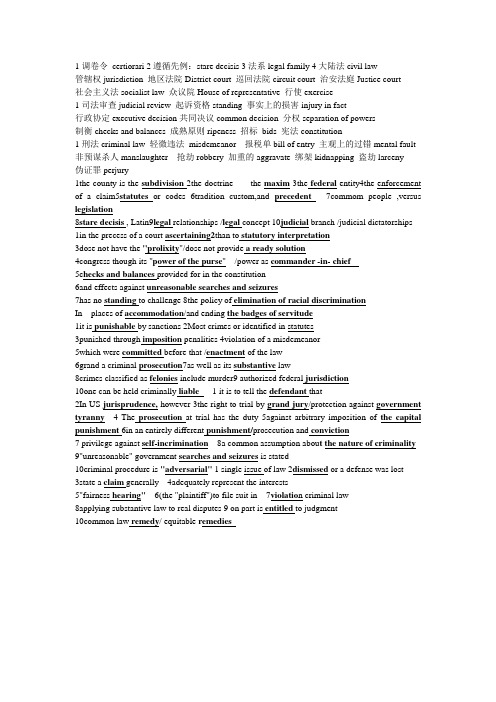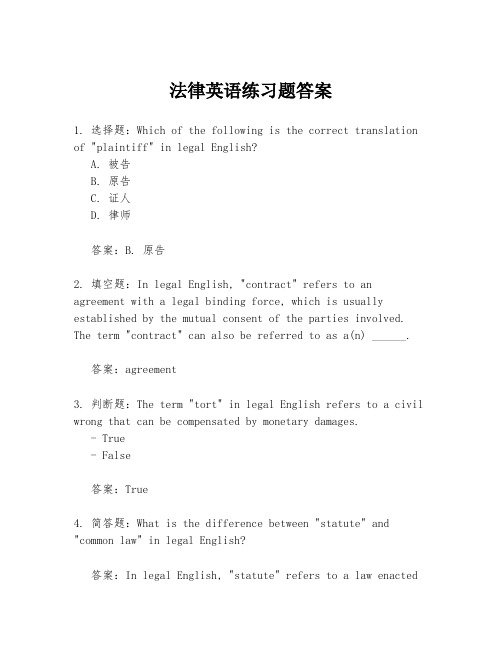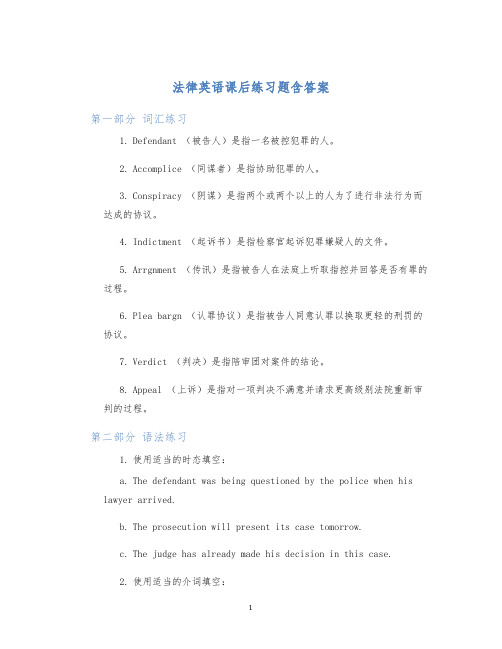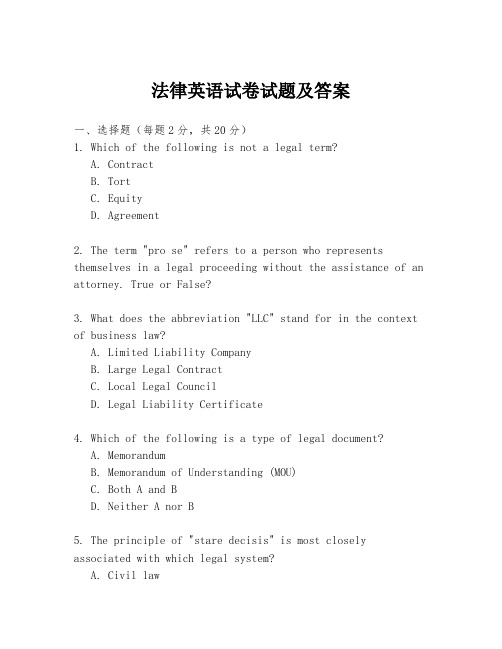法律英语练习题答案
法律英语试题答案

1调卷令certiorari 2遵循先例:stare decisis 3法系legal family 4大陆法civil law管辖权jurisdiction 地区法院District court 巡回法院circuit court 治安法庭Justice court社会主义法socialist law 众议院House of representative 行使exercise1司法审查judicial review 起诉资格standing 事实上的损害injury in fact行政协定executive decision共同决议common decision 分权separation of powers制衡checks and balances 成熟原则ripeness 招标bids 宪法constitution1刑法criminal law 轻微违法misdemeanor 报税单bill of entry 主观上的过错mental fault 非预谋杀人manslaughter 抢劫robbery 加重的aggravate 绑架kidnapping 盗劫larceny伪证罪perjury1the county is the subdivision 2the doctrine ---the maxim 3the federal entity4the enforcement of a claim5statutes or codes 6tradition custom,and precedent 7commom people ,versus legislation8stare decisis , Latin9legal relationships /legal concept 10judicial branch /judicial dictatorships 1in the precess of a court ascertaining2than to statutory interpretation3dose not have the ''prolixity"/dose not provide a ready solution4congress though its "power of the purse" /power as commander -in- chief5c hecks and balances provided for in the constitution6and effects against unreasonable searches and seizures7has no standing to challenge 8the policy of elimination of racial discriminationIn places of accommodation/and ending the badges of servitude1it is punishable by sanctions 2Most crimes or identified in statutes3punished through imposition penalities 4violation of a misdemeanor5which were committed before that /enactment of the law6grand a criminal prosecution7as well as its substantive law8crimes classified as felonies include murder9 authorized federal jurisdiction10one can be held criminally liable 1 it is to tell the defendant that2In US jurisprudence, however 3the right to trial by grand jury/protection against government tyranny 4 The prosecution at trial has the duty 5against arbitrary imposition of the capital punishment 6in an entirely different punishment/prosecution and conviction7 privilege against self-incrimination8a common assumption abou t the nature of criminality 9"unreasonable" government searches and seizures is stated10criminal procedure is "adversarial" 1 single issue of law 2dismissed or a defense was lost3state a claim generally 4adequately represent the interests5"fairness hearing" 6(the "plaintiff")to file suit in 7violatio n criminal law8applying substantive law to real disputes 9 on part is entitled to judgment10common law remedy/ equitable remedies。
法律英语试题与答案

法律英语试题与答案法律英语试题与答案一、单项选择题(每题的备选项中,只有1个最符合题意)1、王某贩卖盗版光碟被文化局查处,罚款1000元。
王某不服申请行政复议,但是复议机关也维持了处罚决定。
王某逾期不履行维持原具体行政行为的行政复议决定,应当如何处理?()A.由作出原具体行政行为的行政机关依法强制执行,或者申请人民法院强制执行B.由行政复议机关依法强制执行C.由行政复议机关申请人民法院强制执行D.由作出原具体行政行为的行政机关或行政复议机关依法强制执行,或者申请人民法院强制执行2、对复议机关的复议决定不服,是否可以向复议机关的上级机关申请再复议?()A.不能申请再复议,因为我国行政复议实行一级复议制B.一般情况下,不能申请复议,但法律另有规定时,可以在经过一级复议后申请再复议C.一般情况下,不能申请复议,但行政法规另有规定时,可以在经过一级复议后申请再复议D.一般情况下,不能申请复议,但规章另有规定时,可以在经过一级复议后申请再复3、对某市某县公安局派出所以该县公安局的名义作出的具体行政行为不服申请的复议,应由下列哪项所述机关管辖?()A.该县公安局B.该派出所C.该县人民政府或某市公安局D.某市人民政府4、对复议前置的案件,行政复议机关决定不予受理或者超期不作答复的,申请人可以依法()。
A.向上级机关申诉B.向上级行政机关申请复议C.向人民法院提起行政诉讼D.无法提起行政诉讼5、A市某县土地管理局以刘某非法占地建住宅为由,责令其限期拆除建筑,退还所占土地。
刘某不服,申请行政复议。
下列哪种说法是正确的?( )A.复议机关只能为A市土地管理局B.若刘某撤回复议申请,则无权再提起行政诉讼C.刘某有权委托代理人代为参加复议D.若复议机关维持了某县土地管理局的决定,刘某逾期不履行的,某县土地管理局可以自行强制执行6、为了加强治安管理,某治安联防队受公安机关的委托维持当地的社会治安,在一次巡逻中,因发现王某一伙人有结伙殴斗的危险,遂对王某等人进行了警告,但王某不服提出复议,那么此案,应以谁为被申请人?( )A.治安联防队B.公安机关C.治安联防队和公安机关D.不能申请复议,谈不上以谁为被申请人7、熊某与李某同为某乡农民,2004年12月6日,两人因宅基地的事发生争执,李某乘熊某不备向其腰间踢了一脚,熊某被送往医院,经诊断后认定肋骨骨折,但后果并非特别严重,未构成犯罪,乡派出所对此事进行调查后对李某作出罚款1000元的行政处罚。
法律英语练习题答案

法律英语练习题答案1. 选择题:Which of the following is the correct translation of "plaintiff" in legal English?A. 被告B. 原告C. 证人D. 律师答案:B. 原告2. 填空题:In legal English, "contract" refers to an agreement with a legal binding force, which is usually established by the mutual consent of the parties involved. The term "contract" can also be referred to as a(n) ______.答案:agreement3. 判断题:The term "tort" in legal English refers to a civil wrong that can be compensated by monetary damages.- True- False答案:True4. 简答题:What is the difference between "statute" and "common law" in legal English?答案:In legal English, "statute" refers to a law enactedby a legislative body, whereas "common law" refers to the body of law derived from judicial decisions of courts and similar tribunals.5. 翻译题:请将以下句子翻译成英文。
法律英语教程课后练习题含答案

法律英语教程课后练习题含答案本文是法律英语教程课后练习题的答案文档,共计包含6道练习题,每个练习题都要求以英语书写,旨在提高法律英语的水平。
练习题1What is the difference between litigation and arbitration?答案Litigation involves a lawsuit in a court of law, where a judge or a jury decides the outcome of the dispute. Arbitration, on the other hand, is a process in which two parties agree to have a neutral third party hear their dispute and render a decision. The decision is binding and may not be appealed.练习题2What is a contract?答案A contract is a legally binding agreement between two or moreparties that creates obligations that are enforceable by law. Each party in a contract agrees to perform certn obligations in exchange for some form of consideration.练习题3What is a tort?A tort is a civil wrong that causes harm or injury to another person or property. Examples of torts include negligence, defamation, invasion of privacy, and intentional infliction of emotional distress.练习题4What is intellectual property?答案Intellectual property refers to creations of the mind, such as inventions, literary and artistic works, designs, symbols, and names used in commerce. The law protects intellectual property through patents, trademarks, and copyrights.练习题5What is a trademark?答案A trademark is a symbol, word, phrase, or design that identifies and distinguishes the goods or services of one party from those of another. Trademarks are protected by law and can be registered with the government.练习题6What is the difference between a felony and a misdemeanor?A felony is a serious crime that is punishable by imprisonment in a state or federal prison for more than a year. Examples of felonies include murder, robbery, and drug trafficking. A misdemeanor, on the other hand, is a less serious crime that is punishable by a fine or imprisonment in a local jl for up to a year. Examples of misdemeanors include traffic violations, disorderly conduct, and petty theft.以上是本文的6道法律英语练习题及答案,希望对您的法律英语学习有所帮助。
法律英语模拟试题及答案

法律英语模拟试题及答案一、选择题(每题2分,共20分)1. Which of the following is NOT a fundamental principle of contract law?A. Offer and acceptanceB. ConsiderationC. Promissory estoppelD. Mistake of fact2. The term "tort" refers to:A. A breach of contractB. A civil wrongC. A criminal actD. A legal document3. In the context of criminal law, "actus reus" refers to:A. The guilty mindB. The criminal actC. The harm causedD. The punishment imposed4. Which of the following is a type of intellectual property?A. A patentB. A copyrightC. A trademarkD. All of the above5. "Jurisdiction" in legal terms means:A. The power to make a legal decisionB. The area over which the law appliesC. The process of suing someoneD. The legal profession6. A "fiduciary duty" is an obligation that arises when:A. A contract is breachedB. A crime is committedC. A trust is establishedD. A lawsuit is filed7. The doctrine of "res ipsa loquitur" is used to establish:A. The defendant's intentB. The plaintiff's negligenceC. The defendant's negligenceD. The plaintiff's damages8. "Precedent" in legal terms refers to:A. A previous legal decision that can be used to decide similar casesB. A legal principle that is universally acceptedC. A legal document that sets out the facts of a caseD. A legal argument that has been accepted by a court9. A "class action" is a lawsuit brought by:A. A single plaintiff on behalf of a group of peopleB. A group of plaintiffs on behalf of a single personC. A group of plaintiffs on behalf of themselves and othersD. A single plaintiff on behalf of themselves only10. "Probate" is the legal process of:A. Filing a lawsuitB. Administering an estate after deathC. Determining the validity of a willD. Both B and C二、填空题(每题1分,共10分)11. The legal term "_____" refers to the act of formally charging someone with a crime.12. A "_____" is a legal document that outlines the terms and conditions of an agreement between parties.13. "_____" is the legal principle that states that a person cannot be tried or punished twice for the same offense.14. "_____" is a legal remedy that requires the defendant to perform a specific act or to stop performing a certain act.15. "_____" is the process by which a person is released from prison before the end of their sentence, usually under supervision.16. "_____" refers to the legal responsibility to act primarily for the benefit of another person or entity.17. "_____" is a legal term for the right to use a public way for specific purposes, such as crossing another's land.18. "_____" is the legal principle that a person is innocent until proven guilty.19. "_____" is a legal document that provides evidence of a person's identity and citizenship.20. "_____" is the legal process of formally ending a marriage.三、简答题(每题5分,共30分)21. Define "due diligence" in the context of a legaltransaction.22. Explain the concept of "estoppel" in contract law.23. What is the difference between "assault" and "battery" in criminal law?24. Describe the purpose of a "non-compete agreement" in employment law.四、案例分析题(每题5分,共20分)25. John offers to sell his car to Mary for $10,000. Mary agrees to buy the car but later discovers that the car has a serious engine problem that John knew about but did not disclose. Analyze the situation using the principles of contract law.26. Alice is walking her dog in a public park. A stranger, Bob, suddenly throws a rock at the dog, causing it to run away. Alice sues Bob for the emotional distress she suffered as a result. Discuss the legal issues involved in this case.27. Company X is accused of patent infringement by Company Y. Company X claims that they were not aware of the patent and had conducted a thorough search before developing their product. What legal defense might Company X use?28. Jane is a minor who signed a contract with a company to star in a television show. Later, Jane decides she does not want to participate and wants to void the contract. Whatlegal considerations might apply to Jane's situation?五、论述题(每题15。
法律专业英语试题及答案

法律专业英语试题及答案一、选择题(每题1分,共10分)1. Which of the following is a fundamental principle of the legal system?A. EqualityB. JusticeC. FairnessD. All of the above2. The term "judiciary" refers to:A. The legislative branch of governmentB. The executive branch of governmentC. The branch of government responsible for interpreting and applying the lawD. The branch of government responsible for enforcing laws3. In the context of contract law, what is "consideration"?A. The thought process behind a contractB. The legal element that something of value is exchangedC. The written document of a contractD. The person who is bound by the contract4. What is the term for the legal principle that a person cannot be tried or punished twice for the same offense?A. Double jeopardyB. MitigationC. RecidivismD. Proportionality5. Which of the following is a type of legal document?A. DeedB. NovelC. MemoD. Invoice6. The term "pro se" means:A. Against oneselfB. On behalf of oneselfC. On behalf of anotherD. Against another7. What is the difference between "civil law" and "criminal law"?A. Civil law deals with disputes between individuals, while criminal law deals with offenses against the state.B. Criminal law deals with disputes between individuals, while civil law deals with offenses against the state.C. Both deal with offenses against the state.D. Both deal with disputes between individuals.8. What does the term "habeas corpus" mean?A. A writ requiring a person to be brought before a courtB. A legal document that ends a lawsuitC. A legal document that begins a lawsuitD. A writ that allows a person to be detained withouttrial9. In legal terms, "precedent" refers to:A. A legal principle or rule established in a previouscaseB. A legal document that is used as evidenceC. A legal principle that is always followed without exceptionD. A legal principle that is never followed10. What is the term for a legal dispute between two or more parties?A. LitigationB. MediationC. ArbitrationD. Negotiation二、填空题(每题1分,共5分)11. The legal principle of "innocent until proven guilty" is known as ________.12. A person who is not a lawyer but represents themselves in court is said to be acting ________.13. The process of a court determining the rights and obligations of parties in a dispute is called ________.14. A legal document that outlines the terms of a contract is known as a(n) ________.15. The area of law dealing with disputes over property is known as ________.三、简答题(每题5分,共10分)16. Explain the concept of "estoppel" in legal terms.17. What are the key differences between "common law" and "civil law" systems?四、案例分析题(每题15分,共15分)18. A company has been accused of breaching a contract with a supplier. The supplier claims that the company has failed to pay for goods delivered. The company argues that the goods were not delivered as per the agreed terms. Analyze the situation from a legal perspective, considering theprinciples of contract law.五、论述题(每题20分,共20分)19. Discuss the role of the judiciary in a democratic society and its importance in upholding the rule of law.答案:一、1. D2. C3. B4. A5. A6. B7. A8. A9. A10. A二、11. Presumption of innocence12. Pro se13. Adjudication14. Contract15. Property law三、16. Estoppel is a legal principle that prevents a person from asserting a claim or right that contradicts a previous position or statement they have made, especially when it would be unfair to allow them to do so.17. Common law systems rely heavily on judicial precedent, while civil law systems are based on comprehensive written codes. Common law is primarily developed through case law, whereas civil law is developed through legislative statutes.四、18. In this case, the supplier would need to provide evidence of the contract and proof of delivery of the goods. The company would need to show that the goods were not delivered according。
法律英语课后练习题含答案 (2)

法律英语课后练习题含答案第一部分词汇练习1.Defendant (被告人)是指一名被控犯罪的人。
2.Accomplice (同谋者)是指协助犯罪的人。
3.Conspiracy (阴谋)是指两个或两个以上的人为了进行非法行为而达成的协议。
4.Indictment (起诉书)是指检察官起诉犯罪嫌疑人的文件。
5.Arrgnment (传讯)是指被告人在法庭上听取指控并回答是否有罪的过程。
6.Plea bargn (认罪协议)是指被告人同意认罪以换取更轻的刑罚的协议。
7.Verdict (判决)是指陪审团对案件的结论。
8.Appeal (上诉)是指对一项判决不满意并请求更高级别法院重新审判的过程。
第二部分语法练习1.使用适当的时态填空:a.The defendant was being questioned by the police when hislawyer arrived.b.The prosecution will present its case tomorrow.c.The judge has already made his decision in this case.2.使用适当的介词填空:a.The lawyer was confident in his client’s innocence.b.The defendant was charged with murder.c.The prosecution presented strong evidence agnst thedefendant.3.选择合适的词填空:a.The defense attorney argued that the prosecution did nothave ____ (sufficient / efficient) evidence to prove their case.b.The judge declared a ____ (mistrial / mistrust) due to jurymisconduct.c.The defendant decided to plead guilty in exchange for a ____(lighter / lighter) sentence.第三部分阅读理解For many years, a defendant’s right to a speedy trial has been an important part of the American legal system. This right is guaranteed by the Sixth Amendment to the Constitution, which states that。
法律英语试卷试题及答案

法律英语试卷试题及答案一、选择题(每题2分,共20分)1. Which of the following is not a legal term?A. ContractB. TortC. EquityD. Agreement2. The term "pro se" refers to a person who represents themselves in a legal proceeding without the assistance of an attorney. True or False?3. What does the abbreviation "LLC" stand for in the context of business law?A. Limited Liability CompanyB. Large Legal ContractC. Local Legal CouncilD. Legal Liability Certificate4. Which of the following is a type of legal document?A. MemorandumB. Memorandum of Understanding (MOU)C. Both A and BD. Neither A nor B5. The principle of "stare decisis" is most closely associated with which legal system?A. Civil lawB. Common lawC. Religious lawD. International law6. What is the term for the legal process of resolving disputes outside the court system?A. LitigationB. MediationC. ArbitrationD. Negotiation7. In the context of intellectual property law, "patent" refers to:A. A right to exclude others from making, using, or selling an inventionB. A document that grants ownership of a work of literature or artC. A legal document that protects a brand name or logoD. A license to practice a profession8. Which of the following is a fundamental principle of criminal law?A. Presumption of innocenceB. Right to a fair trialC. Both A and BD. Neither A nor B9. The term "precedent" in legal English refers to:A. A legal principle or rule established in a previous case that is binding in courtB. A document that outlines the facts of a caseC. A legal agreement between partiesD. A formal request for a court to review a case10. What does the term "actus reus" mean in criminal law?A. The guilty mindB. The wrongful actC. The criminal intentD. The legal defense二、填空题(每空1分,共10分)11. In legal English, "due process" refers to the fundamental legal rights that must be observed to ensure a fair trial.- The term "due process" is derived from the Latin phrase "due process of law."12. A "writ" is a formal written order issued by a court, typically directed to someone other than the parties in a case.- An example of a writ is a "writ of _habeas corpus_."13. The term "negligence" in tort law refers to the failure to exercise the degree of care that a reasonable person would exercise in the same situation to prevent harm to others.- In order to establish negligence, a plaintiff must prove the defendant's duty of care, breach of that duty, causation, and _damages_.14. "Probate" is the legal process by which a will is proved to be valid or invalid.- The court that oversees probate proceedings is known as the _probate court_.15. "Jurisdiction" refers to the authority of a court to hear and decide cases.- There are different types of jurisdiction, including_personal jurisdiction_, subject matter jurisdiction, and territorial jurisdiction.三、简答题(每题5分,共20分)16. Define "actus reus" and "mens rea" in the context of criminal law.17. Explain the concept of "joint and several liability" in tort law.18. What is the difference between "specific performance" and "damages" as remedies in contract law?19. Describe the process of "discovery" in civil litigation.四、案例分析题(每题15分,共30分)20. Case Study: A company has been accused of patent infringement. The company argues that they were not aware of the patent and therefore should not be held liable. Discuss the legal principles that may apply to this case and the possible outcomes.21. Case Study: A tenant has been evicted from their apartment without proper notice. The tenant claims that the eviction was unlawful. Analyze the relevant legal provisions and discuss the tenant's potential remedies.五、论述题(共20分)22. Discuss the role of language in legal interpretation and the challenges it presents. Provide examples to support your argument.参考答案:一、选择题1-5: D T A B B6-10: B C A B B二、填空题11. "due process of law"。
- 1、下载文档前请自行甄别文档内容的完整性,平台不提供额外的编辑、内容补充、找答案等附加服务。
- 2、"仅部分预览"的文档,不可在线预览部分如存在完整性等问题,可反馈申请退款(可完整预览的文档不适用该条件!)。
- 3、如文档侵犯您的权益,请联系客服反馈,我们会尽快为您处理(人工客服工作时间:9:00-18:30)。
法律英语练习题答案
法律英语练习题答案
在学习法律英语的过程中,练习题是不可或缺的一部分。
通过解答练习题,我们可以巩固对法律英语的理解,提高自己的语言能力和专业知识。
下面是一些常见的法律英语练习题及其详细答案,希望对大家的学习有所帮助。
练习题一:请解释以下法律术语的含义:
1. Tort
2. Plaintiff
3. Defendant
4. Liability
5. Jurisdiction
答案一:
1. Tort:指的是民事侵权行为,即一方在未经对方同意的情况下,通过自己的行为或不作为,侵犯了对方的合法权益,给对方造成了损害。
常见的侵权行为包括人身伤害、财产损失等。
2. Plaintiff:原告,指的是在民事诉讼中提起诉讼的一方,即受到侵权行为损害的一方。
3. Defendant:被告,指的是在民事诉讼中被控告的一方,即被指控犯有侵权行为的一方。
4. Liability:责任,指的是法律上的义务或责任。
在民事诉讼中,责任通常指的是被告对原告所造成的损害承担赔偿责任。
5. Jurisdiction:管辖权,指的是法院对案件的审理权限。
不同的法院有不同的
管辖权,根据案件的性质、金额等因素来决定哪个法院有权审理该案件。
练习题二:请将以下英文法律名词翻译成中文:
1. Contract
2. Arbitration
3. Injunction
4. Intellectual property
5. Negligence
答案二:
1. 合同
2. 仲裁
3. 禁令
4. 知识产权
5. 过失
练习题三:请解释以下法律原则的含义:
1. Presumption of innocence
2. Due process
3. Burden of proof
4. Reasonable doubt
5. Double jeopardy
答案三:
1. Presumption of innocence:无罪推定,指的是在刑事诉讼中,被告在未被证明有罪之前,应被认定为无罪。
法律要求控方必须提供足够的证据来证明被告
的有罪。
2. Due process:正当程序,指的是法律保障公民权利的一种原则。
在法律程序中,被告有权获得公正的审判,包括合理的通知、听证权、辩护权等。
3. Burden of proof:举证责任,指的是在诉讼中,证据的提供责任由诉讼一方承担。
控方通常承担举证责任,即提供足够的证据来支持其指控。
4. Reasonable doubt:合理怀疑,指的是在刑事诉讼中,陪审团对被告的有罪存在合理的怀疑。
如果陪审团不能排除合理怀疑,被告应被认定为无罪。
5. Double jeopardy:双重危险原则,指的是在刑事诉讼中,被告不得因同一罪行两次受到起诉或惩罚。
这个原则保护被告免受重复追诉和惩罚的侵犯。
通过解答以上练习题,我们可以更好地理解法律英语的专业术语和原则。
在学习法律英语时,不仅要掌握词汇和语法,还要了解法律背景和文化背景。
希望大家通过不断的练习和学习,能够在法律英语领域取得更好的成绩。
